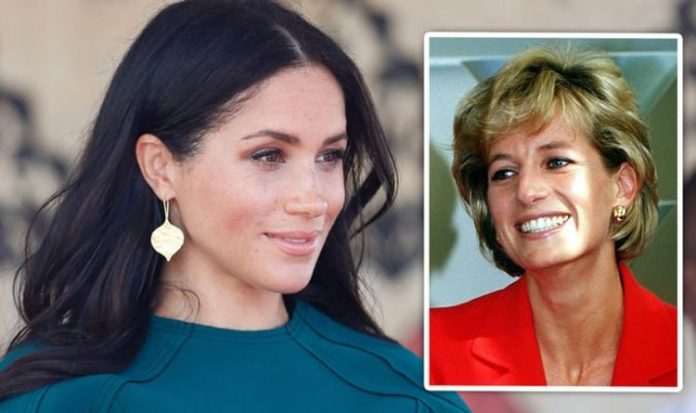Meghan’s propensity to speak out on issues, no matter how thorny they may be for the Royal Family, makes her similar to Princess Diana, according to author Robert Lacey. In fact, the Duchess of Sussex has gone a “stage further” than Prince Harry and Prince William’s beloved mother, the author said.
The royal expert told Vanity Fair: “Meghan is used to using her celebrity platform to speak about issues that matter to her.
“When she, Harry, William, and Kate were at a Royal Foundation Forum even before she had married into the Royal Family Meghan was very vocal and spoke about the rights of minorities and rights for women.
“She’s a self-made celebrity and I think she was just too much for the palace to handle.
“There’s a systemic challenge there. She’s like Diana but a stage further, and that’s a challenge for the Royal Family.”

Meghan Markle joined the Royal Family in 2018 (Image: GETTY)

Princess Diana meeting an HIV positive person (Image: GETTY)
Similarly to Meghan, Princess Diana also started to dedicate herself to issues the royals have never tackled before.
The Princess of Wales brought the public’s attention on people suffering from leprosy while also dismissing the damaging myth the disease could be spread simply by touching someone with this disease.
Diana also campaigned in favour of a worldwide landmine ban, literally walking through a minefield in Angola.
The princess was pivotal in changing the conversation surrounding HIV and AIDS patients.
READ MORE: Sussexes risk stark US backlash if ‘election interference’ continues

The Sussexes and the Cambridges at the Royal Foundation Forum (Image: GETTY)
Months before joining the Royal Family, Meghan was already speaking about female empowerment.
The Duchess had dedicated much of her humanitarian work on gender equality, travelling to Rwanda and India to shine a light on how important it is girls can access education.
During her appearance alongside the Cambridges and Prince Harry at the Royal Foundation Forum in 2018, Meghan immediately set out her intentions to include her area of interest in the charitable platform created by the royal brothers in 2009.
DON’T MISS

Meghan spoke about female empowerment at the Forum (Image: GETTY)

Princess Diana walking through a minefield in Angola (Image: GETTY)
Expressing her support for the Time’s Up and Me Too movements, the then-Ms Markle said: “Right now, with so many campaigns like Me Too and Time’s Up, there is no better time to continue to shine a light on women feeling empowered and people supporting them.”
Mr Lacey noted in his book Battle of Brothers how this remark mentioning the Time’s Up movement was “quite revolutionary”.
He wrote: “No one – neither on the stage, nor in the audience, nor even in the attentive and critical press pack – appeared to realise quite how revolutionary was this suggestion that the new recruit was making.
“Created in America only the previous month and linked to #MeToo, #TimesUp was a $13 million legal defence fund seeking legislation to discipline and punish companies that tolerated sexual harassment.

Meghan Markle and Prince Harry married in Windsor (Image: EXPRESS)
“Legislation meant politics – and in royal terms politics was simply taboo.
“It was a total no-no for the British Royal Family to endorse any cause, no matter how virtuous, that could be seen to take one political side against another.”
After stepping down as senior royal, Meghan has spoken more freely about topics she cares about, such as voter registration and racial equality.
In June, after backing the Black Lives Matter movement, the Duchess took part in a video call with Prince Harry and young leaders of the Commonwealth saying there was the need to “right the wrongs” of the past.

Meghan Markle has dedicated her humanitarian work to female empowerment (Image: GETTY)
She said: “We’re going to have to be a little uncomfortable right now, because it’s only in pushing through that discomfort that we get to the other side of this and find the place where a high tide raises all ships.
“Equality does not put anyone on the back foot, it puts us all on the same footing – which is a fundamental human right.”
She added this would be a “moment of reckoning”, where people “own” their past mistakes.







